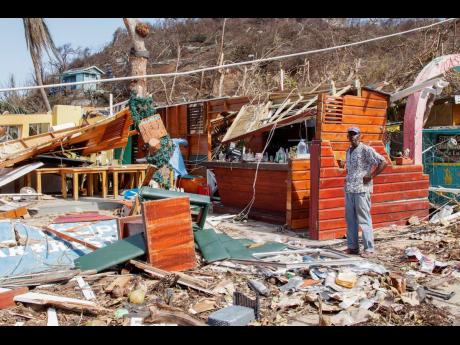After the storm
How to deal with mental health challenges
IT IS natural to feel stressed in challenging situations such as job interviews, school examinations, unrealistic workloads, an insecure job, or conflict with family, friends or colleagues. For many people stress reduces over time as the situation improves or as they learn to cope emotionally with the situation.
Stress tends to be widespread during events such as major economic crises, disease outbreaks, natural disasters, war, and community violence. Everyone reacts differently to stressful situations, and coping styles and symptoms of stress vary from person to person.
Hurricane Beryl’s financial costs will run into the billions, but its emotional, mental, and physical costs are incalculable.
Mental health issues after a catastrophic event like Hurricane Beryl do not always appear right away, either. They can affect people for years. Studies show that survivors of life-changing natural disasters face increased risk of developing anxiety, depression and post-traumatic stress disorder (PTSD).
According to Dr Rivane Chybar Virgo, medical doctor, and health and wellness coach, traumatic events like Hurricane Beryl are marked by a sense of horror, helplessness, serious injury, or the threat of serious injury or death. This affects survivors, rescue workers, and the friends and relatives of victims who have been involved.
“During the storm and the immediate events leading up to it, our ‘fight or flight’ response was active as we all prepared and were on edge, waiting for the event. Now, afterward, there’s a feeling of exhaustion as we handle or are still enduring days of living without power and water,” Dr Chybar Virgo said.
“Also, many of us may be feeling a sense of defeat and despair, seeing images of the devastated landscape, living in a town that had a curfew, and being unable to engage in simple activities such as enjoying our once beautiful local beaches. Our lives have been disrupted, and in many instances, permanently,” she added.
PTSD is a psychiatric disorder that may occur in people who have experienced or witnessed a traumatic event, series of events or set of circumstances. An individual may experience this as emotionally or physically harmful or life-threatening and may affect mental, physical, social, and/or spiritual well-being. Examples include natural disasters, serious accidents, terrorist acts, war or combat, rape or sexual assault, historical trauma, intimate partner violence and bullying.
People with PTSD have intense, disturbing thoughts and feelings related to their experience that last long after the traumatic event has ended. They may relive the event through flashbacks or nightmares; they may feel sadness, fear or anger; and they may feel detached or estranged from other people.
People with PTSD may avoid situations or people that remind them of the traumatic event, and they may have strong negative reactions to something as ordinary as a loud noise or an accidental touch.
“For a person to be diagnosed with PTSD, however, symptoms must last for more than a month and must cause significant distress or problems in the individual’s daily functioning. Many individuals develop symptoms within three months of the trauma, but symptoms may appear later and often persist for months and sometimes years. PTSD often occurs with other related conditions, such as depression, substance use, memory problems and other physical and mental health problems,” Dr Chybar Virgo said.
Your symptoms may be normal, especially right after the trauma. One suggestion is to continue to do the things that make you happy and healthy in life. Happiness often comes from the purpose gained from doing things we define as meaningful to ourselves. We can lose our sense of purpose if we stop doing these things.
Oftentimes, the first instinct of someone who has undergone trauma is to withdraw. Isolating ourselves from the things that we love and that give us meaning only worsens things in the long run. If the suffering continues to get worse and does not start to resolve with time, then it may be a good idea to try and obtain professional help.
It is important to note that not everyone who experiences trauma develops PTSD, and not everyone who develops PTSD requires psychiatric treatment. For some people, symptoms of PTSD subside or disappear over time, while others get better with the help of their support system.
However, many people with PTSD need professional treatment to recover from psychological distress that can be intense and disabling. It is important to remember that trauma may lead to severe distress. That distress is not the individual’s fault, and PTSD is treatable. The earlier a person gets treatment, the better chance of recovery.
keisha.hill@gleanerjm.comSOURCE: Lee Health, World Health Organization, Centers for Disease Control and Prevention

